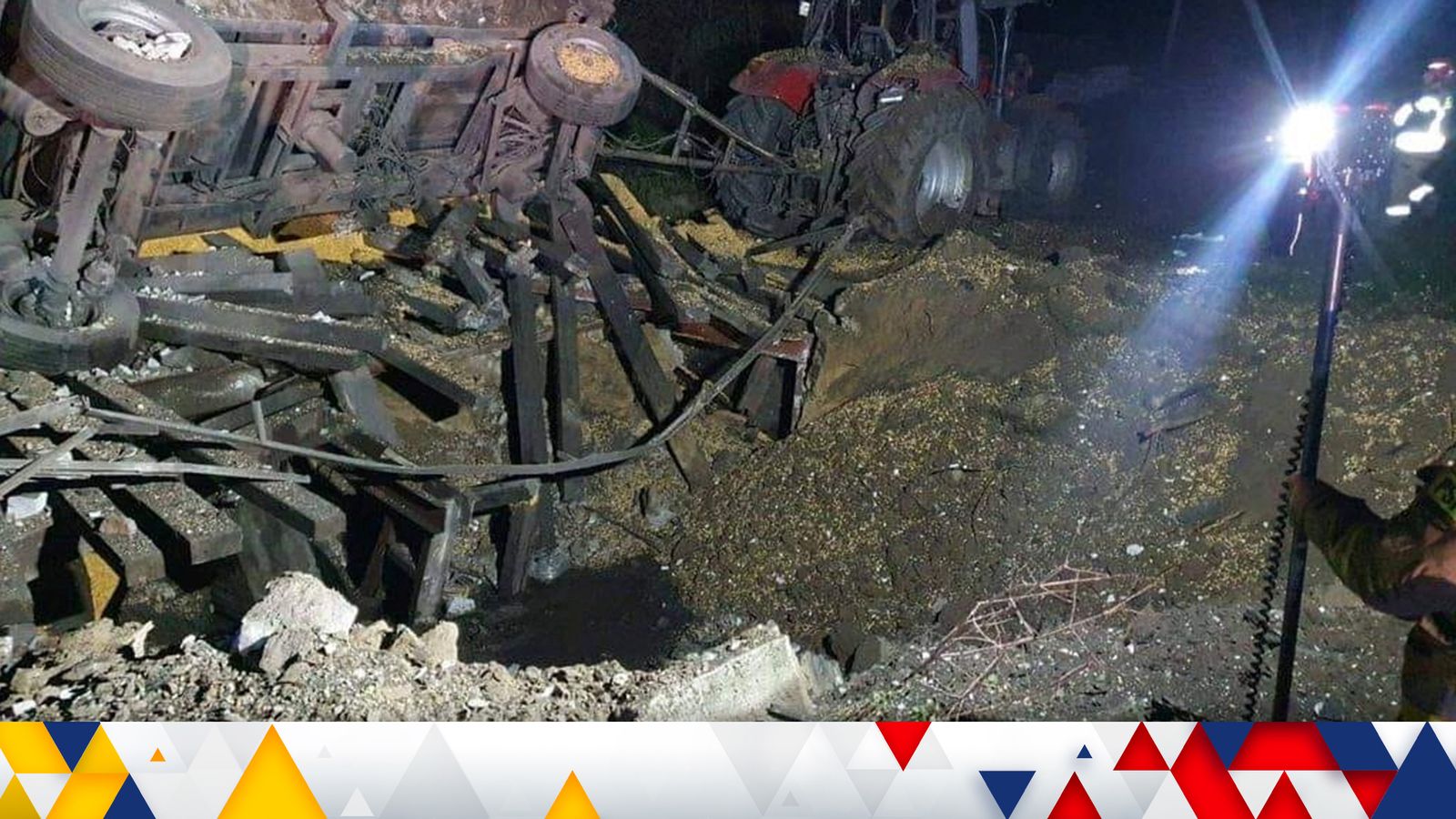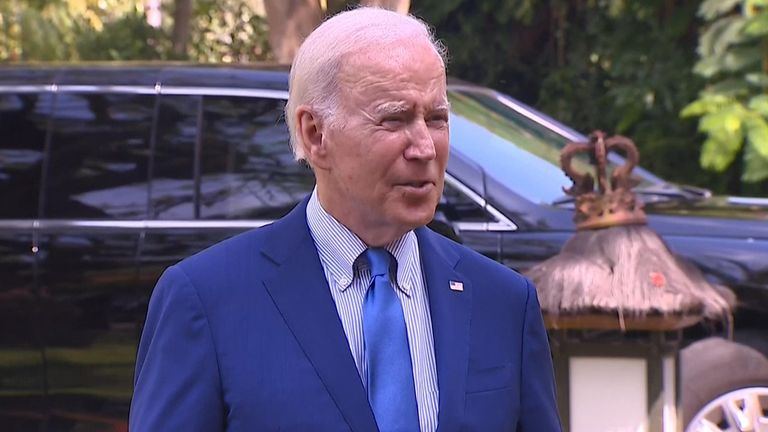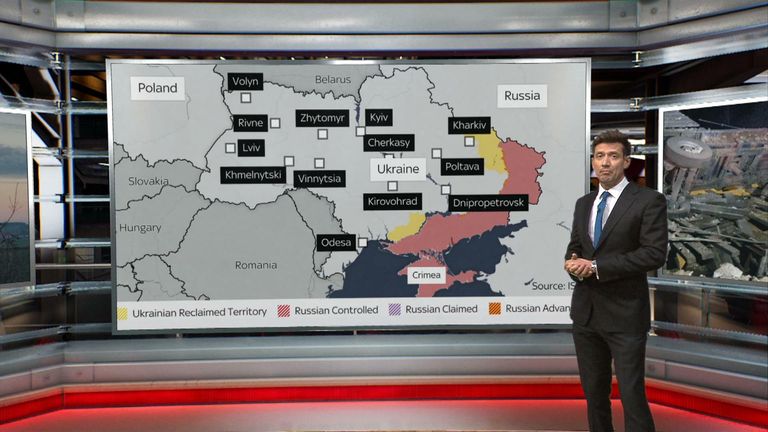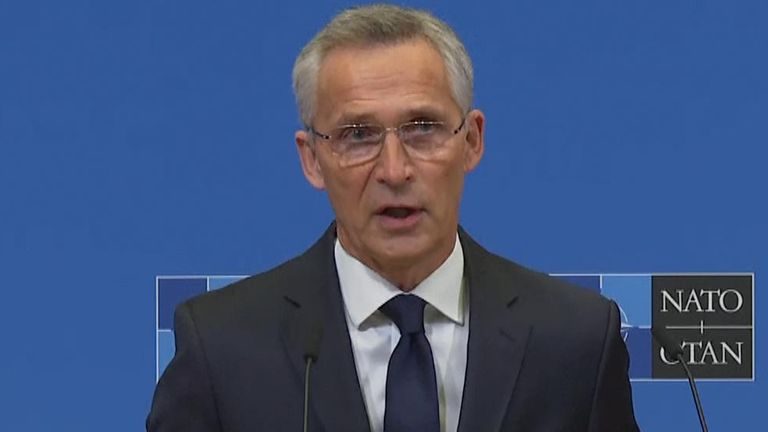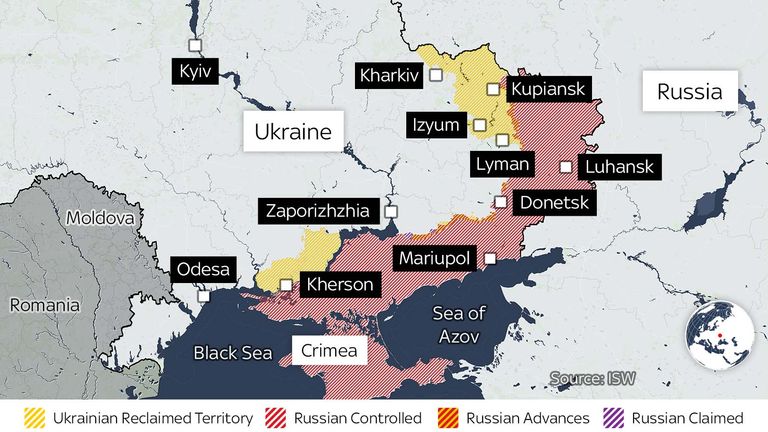US President Joe Biden has disputed Volodymyr Zelenskyy’s assertions that a missile that landed in Poland and killed two people was not of Ukrainian origin.
Ukraine’s president said on Wednesday he had “no doubt” the missile “was not Ukrainian” and called for his officials to have access to the site of the blast.
Ukraine war latest: Biden and Zelenskyy at odds over Poland missile explanation
Mr Biden has said the trajectory suggested the missile was unlikely to have come from Russia and, when asked on Thursday about Mr Zelenskyy’s comments on the issue, he told reporters: “That’s not the evidence.”
The missile hit a grain silo on a farm in Przewodow – around four miles from Poland’s border with Ukraine.
The blast sparked an international outcry amid the possibility it represented a Russian assault on NATO territory, after the Polish ministry of foreign affairs described the missile as “Russian-made”.
However, Moscow insists it did not fire the missile, with Russia’s defence ministry denying Russian involvement, saying: “No strikes on targets near the Ukrainian-Polish state border were made by Russian means of destruction.”
It claimed images of the site showed the wreckage to be that of a Ukrainian S-300 missile.
Three US officials have said preliminary assessments suggest the missile was fired by Ukrainian forces at an incoming Russian one.
Ukraine maintains stocks of Soviet and Russian-made weaponry, including air-defence missiles, and has also seized many more Russian weapons while beating back the Kremlin’s forces during the conflict – now in its ninth month.
The missile blast in Poland had sparked worried talk of NATO’s Article 5, which means an attack on a member country is seen as an attack on all allies.
‘This is not Ukraine’s fault’
But Polish President Andrzej Duda has said his country is “very likely” to instead invoke Article 4, which allows a member country to raise a security issue and have it discussed.
“From the information that we and our allies have, it was an S-300 rocket made in the Soviet Union, an old rocket and there is no evidence that it was launched by the Russian side,” he said.
“It is highly probable that it was fired by Ukrainian anti-aircraft defence to protect Ukrainian territory.”
NATO ambassadors have held emergency talks in response to the war’s first deadly extension into the territory of the Western alliance.
NATO Secretary General Jens Stoltenberg has also spoken about Tuesday’s incident and said whatever the outcome of the investigation into the blast, Russia “bears ultimate responsibility as it continues its illegal war against Ukraine”.
“This is not Ukraine’s fault,” he said.
Other key developments
• Investigators in Ukraine’s southern port city of Kherson have found 63 bodies with signs of torture, the country’s interior minister is quoted as saying by the Interfax Ukraine news agency
• The Czech Republic plans to train up to 4,000 Ukrainian troops in 2023, the country’s defence minister says
• The International Paralympic Committee votes to suspend Russia at its general assembly in Berlin
Russian missile strikes target energy and infrastructure
The incident occurred during what Ukraine has described as the biggest wave of Russian missile strikes on its territory since the start of Russia’s invasion in February.
According to UK intelligence, Russia carried out up to 80 long-range missile strikes – mostly against power infrastructure targets – on Tuesday.
“This is likely the largest number of strikes that Russia has conducted in a single day since the first week of the invasion,” said the UK’s Ministry of Defence.
As Russian forces continue to attack Ukraine’s national infrastructure, this is “drawing deeply upon Russia’s reserves of conventional cruise missiles”, it added in its latest update on the situation on the ground in Ukraine.
It came as fresh Russian missile strikes on Thursday targeted critical infrastructure including gas production facilities and a missile plant, the Interfax Ukraine news agency quoted Ukrainian Prime Minister Denys Shmyhal as saying.
Air raid warnings were issued as explosions were heard in several parts of the country, including the southern port city of Odesa, the capital Kyiv and the central city of Dnipro – home to the huge Pivdenmash missile factory.
There were further reports the southern port city of Odesa was also struck by missiles.
Black Sea grain deal extended
Meanwhile, UN secretary-general Antonio Guterres announced the extension of an international deal to ensure the safe delivery of exports of grain, foodstuffs and fertilisers from Ukraine through the Black Sea.
July’s Turkey and UN-brokered grain export deal ensured safe passage in and out of Odesa and two other Ukrainian ports, Chornomorsk and Yuzhne, and was set to expire on Saturday.
It followed a blockade of Ukrainian ports by Russia’s Black Sea fleet which cut off supplies to grain and other food products around the world and sent global prices soaring.
Ukraine is one of the world’s biggest grain producers and the four-month-old programme averted a global food crisis.
Mr Zelenskyy said earlier that he expected the renewal for at least 120 days, calling it a “key decision in the global fight against the food crisis”.
Click to subscribe to the Sky News Daily wherever you get your podcasts
